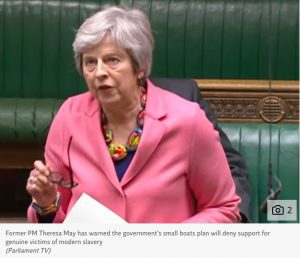Nearly 10,000 suspected modern slavery victims are being forced to wait more than two years for a decision on their case, new figures show, leaving them at risk of further exploitation.
FOI data obtained by The Independent reveals 9,500 likely survivors of modern slavery have been waiting over two years for a decision, over triple the number in 2021 and soaring from 397 cases just four years ago.
In some instances, victims are waiting so long that they are forced back into the arms of exploitative employees, charities and former domestic workers have warned, placing pressure on the National Referral Mechanism (NRM) which is designed to identify and support modern slavery victims while their cases are investigated.
The problem of tackling modern slavery has been highlighted recently by Rishi Sunak’s small boat plan which would disqualify trafficking victims who arrive in the UK illegally from receiving support and could see them deported to Rwanda.
There are currently 29,966 people waiting for a final “conclusive grounds” decision on their modern slavery referral, according to FOI data from the Home Office. Of these, 9,493 suspected victims have been waiting for over two years, statistics from January 2023 show.
This is more than triple the number from 2021, when 2,868 people had been waiting over two years for a decision. In 2022, the two nationalities with the highest number of referrals by police to the support network were Albanian and the UK.
The number of people waiting over two years in 2023 is also significantly higher than the 605 people in this position in 2020, and the 397 in 2019.
According to the January data, 7,375 people had also waited between a year and two years for a decision on their case.
Lib Dems home affairs spokesperson Alistair Carmichael MP said that the delays were not acceptable: “It’s a disgrace that Conservative incompetence is putting vulnerable people in harm’s way.
“Modern slavery decisions should be made swiftly, effectively and compassionately – but the Home Office is totally failing at the task in hand.”
He criticised the government for failing to appoint a new Independent Anti-Slavery commissioner after 10 months without anyone in the position, calling for someone to fill the role “without delay”.
One Filipino domestic worker called Wendy told The Independent that she had been waiting since November 2018 for a decision on her NRM referral.
“When you are waiting for a conclusive grounds decision, all you have is a piece of paper from the Home Office and the employers often don’t accept that,” she said. “I was forced into another job, where I was working long hours.”
Robyn Phillips, director of operations at the Human Trafficking Foundation, said the NRM is acting as a “bridge” to help people out of exploitation to live an independent life.
“While long-term support is vital, the uncertainty of waiting for a decision can deprive someone of their agency and actually cause further harm,” he said.
“For many survivors, being in the NRM system also means that they do not have the right to work, which not only prevents autonomy but also increases the risk of further exploitation.”

Even when the government decides the applicant is a modern slavery victim, as they do in 87 per cent of cases, they can still struggle to get help with many facing immigration limbo and potential deportation, Maya Esslemont, director at After Exploitation, warned.
“Once the purgatory of the NRM ends, survivors are often thrown into a new limbo facing the risk of deportation and immigration detention,” she said.
“Among those survivors who also seek asylum, there is a real risk of exiting the NRM and being housed with strangers in unsuitable, mixed gender asylum accommodation rather than safe housing, even in cases of sex trafficking.”
She added: “We need to see an NRM that guarantees support during and after for however long victims need it.”
Former prime minister Theresa May has criticised the small boats bill saying that the Home Office “knows genuine victims of modern slavery would be denied support” under the legislation.
“As it currently stands, we are shutting the door to victims who are being trafficked,” she added.
Former Independent Anti-Slavery Commissioner, Dame Sara Thornton, previously told The Independent that the policy would “deter victims who know they have entered the country illegally from coming forward.”
A Home Office spokesperson said: “Modern slavery is a barbaric crime and we remain committed to stamping it out. We provide accommodation, financial support, and access to a support worker, to thousands of victims each year through the Modern Slavery Victim Care contract to help them rebuild their lives.
“While the UK’s response to modern slavery is world leading, we continue to hold all policies and procedures under review, including options for how to reduce the current average decision-making times.”
